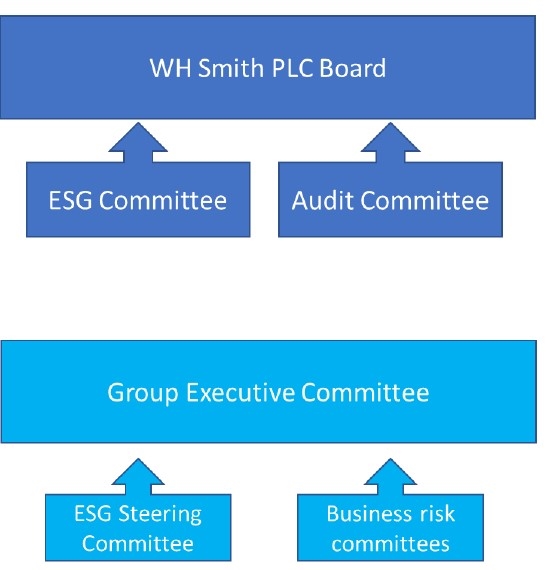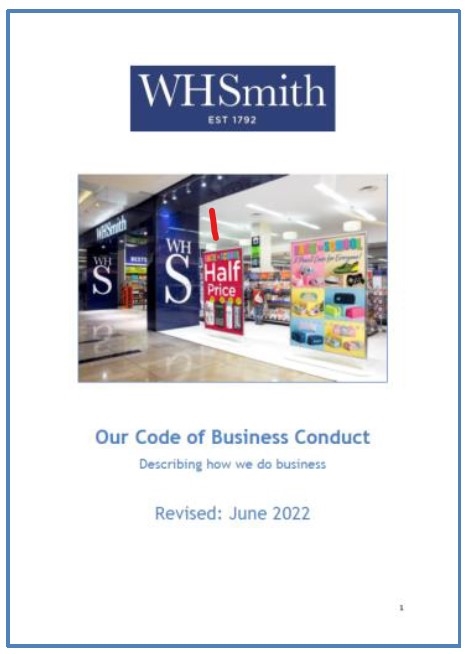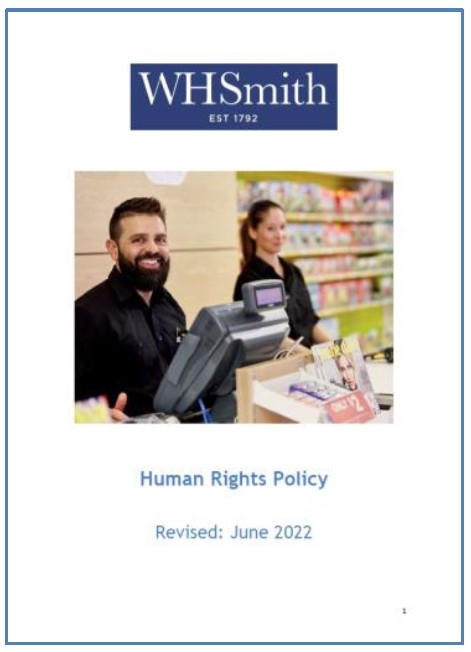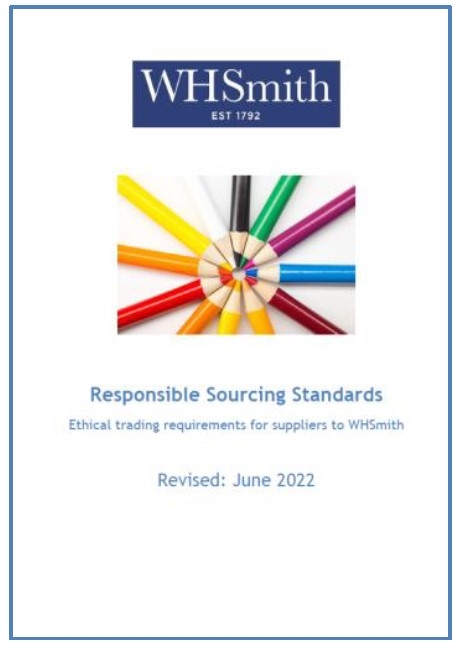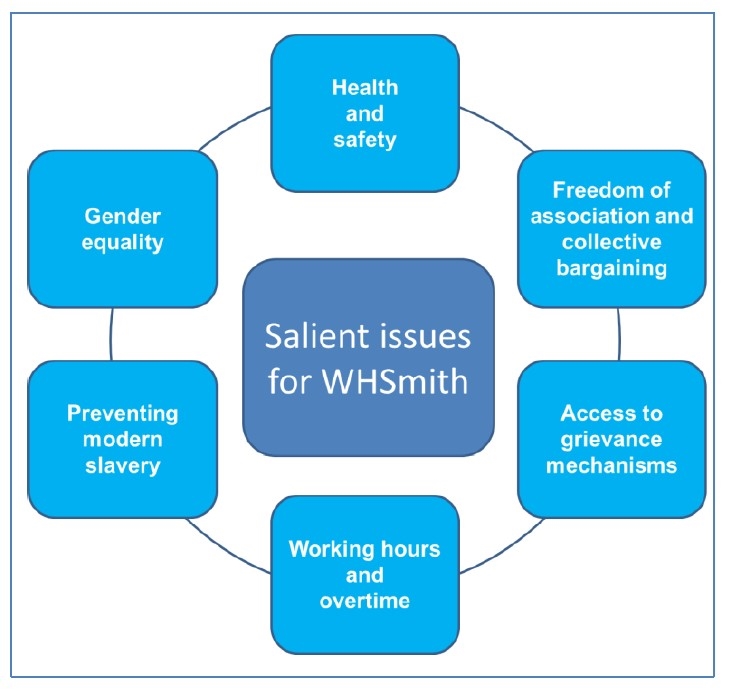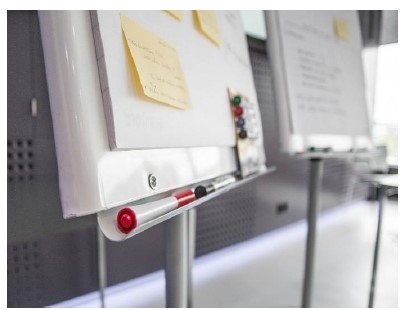IntroductionThis is WH Smith PLC’s (WHSmith)’s seventh annual statement published in accordance with the Modern Slavery Act 2015. It outlines the steps we have taken to prevent modern slavery in our operations and supply chain for the financial year ending 31 August 2022.
Modern slavery, including all forms of slavery, servitude, forced and compulsory labour and human trafficking are abhorrent practices that continue throughout the world today. WHSmith and its group companies are committed to ensuring that the human rights of anyone working for us in any capacity are fully respected. We recognise we have a responsibility to prevent modern slavery, and to mitigate and remediate cases where necessary, and we have zero tolerance for any cases of human rights abuses in our business operations or supply chains.
Our approach includes:
- Ensuring that we have robust policies and governance procedures in place;
- Identifying and assessing risks of modern slavery in our operations and supply chains;
- Due diligence within our own organisation, supply chain and business partner relationships, including training, engagement and a programme of ethical audits.
- Developing and monitoring key performance indicators.
This year, the Covid-19 pandemic has continued to cause disruption for some of our suppliers, particularly those based in China. We have maintained our efforts to identify and protect vulnerable workers, recognising that the potential for Covid-19 to generate greater risks for workers. We continue to focus on the safety and wellbeing of our employees, customers and the wider WHSmith community, including those working in our supply chain.
This statement sets out the steps taken to prevent slavery and human trafficking in the operations and supply chains of all subsidiary companies included within our financial statement for the year 2021 / 22 including WH Smith Retail Holdings Limited, WH Smith Travel Limited, WH Smith High Street Limited, WH Smith Hospitals Limited and our operations in Australia where the Commonwealth Modern Slavery Act 2018 applies. The statement was approved by the Board of WH Smith PLC on 16th January 2023.
Carl Cowling
Group Chief Executive, WH Smith PLC
Date: 16th January 2023
Our business and supply chains
WHSmith is a leading global travel retailer for travel essentials operating from airports, hospitals, railway stations and motorway services areas. We also have a smaller business located on UK high streets and an online presence providing our customers with direct access to stationery, books and gifts.
- Travel UK is the largest division in the Group and operates from airports, hospitals, railways stations and motorway services across the UK, selling a range of products including food and drink, books, magazines, digital accessories, health and beauty products and souvenirs. As at 31st August 2022, the Travel UK operated from over 580 stores.
- Our North America and The Rest of the World division has over 600 stores in 100 airports in 30 countries worldwide, throughout the United States, Australia, the Middle East, Asia and Europe. It includes our North American businesses, operating as Marshall Retail Group (MRG) for speciality retail, and InMotion, the market-leading global technology retailer in travel locations. Further details on international locations, including the numbers of stores in each country, can be found on our website.
- WHSmith High Street sells a wide range of stationery, books, newspapers, magazines, toys, cards and confectionery. As at 31 August 2022, the business operated from over 525 stores located on UK high streets and in shopping centres. We operate approximately 200 Post Offices from within our High Street stores.
We also have an online presence through whsmith.co.uk, our online personalised greetings cards and gifts website funkypigeon.com, our specialist pens business cultpens.com and personalised stationery websites dottyaboutpaper.co.uk and treeofhearts.co.uk.
We directly employ approximately 11,000 colleagues in the UK and approximately 3,000 employees in our direct international businesses (as at 31st August 2022). We use an employment agency to provide workers for our three distribution centres, with numbers reaching a few hundred workers at peak times of the year. Approximately 4,000 colleagues work in our joint venture and franchised stores.
WHSmith has three main types of suppliers. Around 250 suppliers provide our own-brand products – principally stationery and technology accessories. The vast majority of suppliers for our own-brand goods are based in China, but we also source a small number of products from factories in India, Indonesia, Malaysia, South Korea, Taiwan, Turkey and Vietnam. Chilled food is sourced locally within our countries of operation. We have the strongest relationships, and most influence, with our top 20 suppliers by value, where we buy a larger proportion of their supply and tend to have longer-term commercial relationships. Outside of this supply base, we tend to be a comparatively small customer, buying relatively limited quantities, often of seasonal products. Our ability to influence activity with these suppliers is more limited.
Over 2,000 suppliers provide third-party branded products, ranging from large multi-national brands to small enterprises, with complex global supply chains involving thousands of businesses. Finally, we have over 2,000 suppliers of non-merchandise services and goods not for resale, which include IT equipment, cleaning services and logistics. Purchasing and supply chain management are led by a team of buyers based predominantly in the UK, supported by a procurement and ethical trade team based in Hong Kong and Shanghai. All of the operations and supplier relationships described above are included within the scope of this statement.
Governance and policy frameworks
We have a well-developed set of policies and processes to protect the human rights of those who work for us, either directly in our operations, or indirectly through our business partners and in our supply chains. These policies and processes include measures to prevent modern slavery. We will not tolerate any abuse of human rights, including any form of slavery, anywhere in our business, supply chains or partnerships.WHSmith is committed to respecting human rights in our business operations and supply chain as set out in the United Nation’s Universal Declaration of Human Rights; the United Nation’s Guiding Principles on Business and Human Rights; and the International Labour Organization’s Declaration on Fundamental Principles and Rights at Work.
Our governance framework
The WHSmith Board oversees the governance of sustainability issues, including those relating to modern slavery and wider human rights. The Group Board has ultimate responsibility for modern slavery and receives an update on the effectiveness of risk management and controls at least once per year. The ESG Board Committee leads and oversees delivery of our sustainability strategy, setting out our ambition and monitoring progress. The Committee is responsible for understanding the potential impact and related risks of ESG considerations on the business. It approves the Company’s sustainability strategy - including those components relating to human rights and responsible sourcing policies; objectives and the roadmap for delivery; and monitors progress against agreed targets. The ESG Committee meets three times per year. The Group Audit Committee is responsible for governance in respect of company systems for internal controls, business risks and related compliance activities. This includes any principal risks relating to human rights. The Group Executive Committee has overall accountability to the Board for sustainability issues, including those relating to modern slavery. An Environmental, Social and Corporate Governance (ESG) Steering Group chaired by the Group Chief Executive and including the Managing Directors of each business, the Human Resources Director and the Group Communications Director meets monthly to review progress and next steps for all ESG work, including our human rights strategy and modern slavery work.
As part of WHSmith’s risk management processes, detailed risk registers are maintained by each business and used to identify, manage and monitor risks. Business Risk Committees meet quarterly and monitor action plans for measures to prevent modern slavery or associated risk issues in business operations and supply chain. Modern slavery risks and the measures taken to mitigate those risks are co-ordinated by the Head of Sustainability, who also leads the development of policies, processes and wider activities to prevent
modern slavery across our businesses and supply chains.
Policies and standards
Our policy framework includes a number of group-wide standards relevant to protecting human rights and preventing modern slavery, all of which are reviewed annually by our Board-level ESG Committee.
One of WHSmith’s core values is ‘Valuing our People’ and we try to ensure that all colleagues are valued and respected in an open and honest environment. Our
Code of Business Conduct sets out how our business operates, and what is expected of every person who works for and on behalf of WHSmith. This includes WHSmith employees, directors, contractors, subsidiaries, joint ventures, suppliers, franchisees, agents, consultants and professional advisors.
Our Code of Conduct makes it clear that we will not tolerate any form of discrimination, harassment or bullying. In support of this Code of Conduct, we have additional policies covering equality and diversity, dignity at work, grievance mechanisms and whistleblowing.
Our
Human Rights Policy emphasises our commitment to respecting the human rights of our employees, those working for our suppliers and business partners, and our customers and the communities in which we are based. It sets out our values, principles and due diligence procedures for each of our stakeholder groups and includes those linked to grievance mechanisms and access to remedy.
Expectations for suppliers and business partners are set out in our
Responsible Sourcing Standards, which are aligned to the Ethical Trading Initiative’s (ETI’s) Base Code. These Standards provide further clarification on our expectations regarding modern slavery controls, including restrictions on the withholding of identity documents and payments of deposits, additional information on verification checks for child labour and steps to prevent excessive working hours. We also stipulate that no worker should have to pay a fee or other deposit for a job and include specific policy requirements aimed at protecting migrant workers, agency staff and female workers.
We continue to support industry-wide initiatives and are a signatory to the British Retail Consortium’s
Better Retail, Better World actions, which commits the retail industry to build a fairer, more sustainable economy in line with the UN Sustainable Development Goals, including promoting
decent work for all.
Embedding our policies
All employees are expected to re-appraise themselves of the requirements of Our Code of Business Conduct and associated policies covering modern slavery risks on an annual basis and certify that they have done so. The Code of Conduct is also included in induction material for all new starters. We expect our staff to have completed a number of essential training courses relating to responsible commercial practices, including risks from modern slavery.
We regularly refer to the requirements of our Code of Conduct and Responsible Sourcing Standards through our dialogue and engagement with suppliers, business partners and franchisees. WHSmith’s joint venture and franchise partners are required to provide written confirmation of compliance with our policies every year. Our Responsible Sourcing Standards are included in all standard supplier contracts and agreements. Potential new suppliers are informed of our Responsible Sourcing Standards during the tender process so that they can take our requirements into account when quoting for the provision of goods or services. Any potential new supplier of our own-brand products is audited by our in-house, specialist ethical trade team before any order is placed.
Suppliers are required to notify WHSmith of any non-compliances with our Responsible Sourcing Standards. We audit suppliers of our own-brand products at least every two years and have processes in place to deal with any non-conformances and drive continual improvement. Audits are conducted by our in-house, specialist teams based in Hong Kong and Shanghai, who make specific checks on modern slavery as part of their processes. The team undertake announced and unannounced site visits to own brand suppliers, in addition to assessing the reports of inspections undertaken by third party audit firms.
Third party audits, covering the same elements of the ETI’s Base Code as our own, are used to assess compliance with our Responsible Sourcing Standards for those factories where the order value and ethical trade risk is low. Our in-house team will review the report and assess any corrective action plan and may follow this up with a physical visit if there is any doubt that standards are not being met. We also ask our suppliers to ensure that they are upholding the same standards of human rights, including steps to prevent modern slavery in their own supply chains.
Any issues identified are categorised by level of seriousness, and an action plan is put in place to address non-compliance within an agreed timescale. If the factory does not adhere to an agreed corrective action plan to address areas of non-compliance, the supplier receives a formal written warning. This communication outlines the reasons for the warning and the steps which would need to be taken before any orders will be resumed. In the event of any serious violations, we will cease working with that supplier.
WHSmith funds a confidential worker hotline operated by a third-party organisation, to provide a channel for workers to report any concerns that they may have over their employment conditions or possible exploitation. Any suggestion of any breach in our responsible sourcing requirements is investigated thoroughly and the required remediation put in place.
Our confidential whistleblowing hotline, ‘Speak Up’, is available for employees, agency staff and third parties to report any concerns they may have about any aspect of their work for WHSmith, including modern slavery concerns or human rights violations. From the start of the 2022 / 23 financial year, the operation of this telephone line has been outsourced to 'Safecall' who operate this facility independently for many large organisations. There were no reports relating to modern slavery made via our whistleblowing line during the financial year 2021 / 22.
Risk identification and assessment
We use a wide range of sources of country and supplier-specific information from external organisations and our own intelligence gathering in order to inform our risk identification and assessment processes.
We recognise that there is a risk of modern slavery in any area of our business or supply chain, but that the risk is greater for certain groups of individuals, such as migrant workers, agency staff and seasonal employees. In order to better understand and continually assess those areas of our business and operations which give rise to the highest modern slavery risks, we use a number of external and internal sources. These include:
- Through our memberships of the ETI and British Retail Consortium (BRC), we receive generic and country and sector-specific information and have access to dialogue with other companies, civil society groups and trade unions on best practice in identifying, managing and reporting on modern slavery issues;
- Sources of modern slavery risks for particular countries (such as the Global Slavery Index produced by the Walk Free Initiative and the International Trade Union Congress’ 2022 ITUC Global Rights Index);
- Information from in-house supplier engagement and audit processes, and third-party audits, including those published through Sedex. We recognise there are limitations in audit investigations, and so our approach includes wider engagement and collaboration processes with suppliers; and
- Interviews with workers and with worker representatives to understand the issues that are important to them in their place of work.
The risk assessment has identified that the greatest areas of potential exposure in our business operations are the use of agency workers contracted for our UK distribution centres and for security and cleaning services, many of whom have moved to the UK from other countries.
In our supply chain, areas of potential exposure include:
- Bonded labour in the manufacture of stationery products, toys, gifts and technology accessories for foreign workers who may have been asked to pay deposits to recruitment agencies, hand over identity papers, or ask for an exit permit to leave the country.
- Exploitation of seasonal and foreign workers in our chilled food supply lines.
- Child labour in the manufacture of stationery products, toys, gifts and technology accessories, particularly in China, India and Malaysia.
- More than 90% of our own-brand products come from China where there is a risk of forced labour, excessive working hours and wages below statutory requirements.
The potential risks from
service providers and other business partners include workers involved with store construction and refit providers; and shipping and distribution partners.
Covid-19 has continued to bring heightened risks to the safety and well-being of some of the workers in our supply chains and for our business partners. Their safety and well-being continue to be our focus, and we have ensured our due diligence activities and engagement processes address any potential risks from Covid-19, such as worker health and safety, and pay and overtime.
We continue to utilise the results of our risk assessment to better understand the nature of potential and actual risks and to ensure that they are being appropriately managed and mitigated.
We have mapped our salient labour issues to identify those issues which are important because of their potential detriment on the people who work for and on behalf of WHSmith:
Due diligence and risk management
Our due diligence processes focus on those areas of highest risk identified by our risk identification and assessment processes. We monitor our business and supply chain for any indicators or evidence of modern slavery or human trafficking and ensure that there are controls in place to prevent incidents occurring.
WHSmith’s due diligence process is based on the
UN Guiding Principles on Business and Human Rights, ensuring that we identify, prevent, mitigate and account for how we address any adverse impacts. Our due diligence is based on some core and practical beliefs – that workers are at the centre of the process; that modern slavery is likely to exist somewhere in our supply chains; that collaboration with business partners, suppliers and other third parties is essential; and that due diligence should be closely aligned to our commercial business practices.
Due diligence in our business operationsOur due diligence activity to mitigate risks from modern slavery in our own operations begins with ensuring that our staff know how to spot the signs of modern slavery, what questions to ask when working with business partners and what else might be required of them to identify and mitigate any risks. Line managers, our human resource teams and personnel working with our franchisees and business partners have all completed our online training course on modern slavery.
Our recruitment and onboarding procedures ensure that employees are eligible to work in their country of residence, and that they have a bank account in their own name. There is a ‘speak up’ line for employees and agency workers to raise any concerns that they have, and call handlers have been trained on how to identify modern slavery risks. Calls are monitored for any suspected concerns in relation to modern slavery.
Management teams in all our international businesses are regularly briefed on possible indicators of modern slavery and the associated risks. Our International Management Team based in our UK head office regularly visit our international operations in Europe, the Middle East and Asia to emphasise the importance of due diligence to prevent modern slavery.
We have made on-going efforts to promote the well-being and mental health of all our workforce, with regular communications about how employees can look after themselves, and places where they can seek support locally if they need it. We continue to promote the WHSmith Benevolent Fund, a registered charity that benefits WHSmith employees and their families who are in financial difficulty or hardship and to ensure that all staff were aware of the support line available for all employees to seek confidential third-party help with any challenges that they may be facing. Over the past two years, we have augmented this with a partnership with an organisation called Salary Finance, which allows colleagues access to free financial education and loans at lower interest rates than those offered by traditional lenders.
On-going dialogue continues with our recruitment agency for employees for our UK distribution centres to check that appropriate policies and practices were in place, and that there have been no reported incidences of modern slavery. Although not mandatory for our sector, the agency has a licence from the Gangmaster’s Labour Abuse Authority and monitors all new workers for indicators of potential forced labour, such as shared addresses, bank details and telephone numbers. We also have controls in place with our recruitment agencies to ensure they understand what it means to recruit responsibly, and that they have the necessary due diligence controls in place to identify any modern slavery risks with staff who are contracted on our behalf.
Due diligence in our supply chain
We continue to focus on our own brand products as we believe we have greater visibility and leverage with this part of our supply chain. We operate a long-established, supply chain monitoring process to assess and mitigate ethical trade risks for our own-brand suppliers. Labour rights are a key part of this process and are included in the evaluation of new suppliers and the on-going management of existing suppliers. The work is undertaken by a specialist team based in Hong Kong and Shanghai.
As part of our supplier on-boarding process, any new suppliers to WHSmith must provide evidence of adherence to international standards of human rights and environmental management and that they comply with our Responsible Sourcing Requirements. All new high risk or high value suppliers are visited by our in-house team before any orders are placed. Lower value potential suppliers are required to provide an independent assessment of their ethical working practices for us to review.
If a potential new supplier is found to be non-compliant with a part of our Responsible Sourcing Requirements, we will try to work with them to address the issue. If we believe that after appropriate support, non-compliances cannot be remedied, we will place no further orders with that particular supplier.
We use a combination of in-house audits, third party assessments and on-going engagement with suppliers and workers to identify any potential or actual incidents of modern slavery. Audits are often unannounced and include confidential worker interviews, inspection of worker accommodation and extensive document checks. Special attention is paid to modern slavery and the process is focussed on risks that are appropriate to individual suppliers. For example, our visits to Chinese factories will look for signs of excessive working hours, risks to agency workers or any signs of under-age labour. The use of in-house auditors based in China has allowed us to continue our programme of factory visits when other third-party international auditors have been unable to travel.
Working hours are closely monitored to ensure that long hours are strictly limited to peak times to cope with seasonal demand and are not a permanent feature for workers. We also ensure that there is a clear policy for voluntary overtime hours which workers agree to and are paid for accordingly. We avoid placing late orders wherever possible to ensure that factories have enough time for production and do not need to put pressure on workers to work long hours.
Covid-19 has continued to cause difficulties for our Chinese suppliers where lockdowns and restrictions on free movement continued throughout 2021 / 22. We have continued to take steps to ensure that workers have been protected as far as possible from the impacts of Covid-19. We have maintained regular engagement with our suppliers have strengthened our due diligence activities to promote worker health and safety, fair payment practices and limits on worker overtime.
During our 2021 / 22 financial year, our factory audit and supplier engagement programme identified a number of non-conformances with those elements of our Responsible Sourcing Requirements that could indicate a heightened risk of modern slavery. These included wages not being paid in accordance with the statutory minimum; missing paperwork in relation to voluntary overtime agreements; working hours in excess of our standards during peak season; and payment irregularities. We have agreed action plans with all suppliers to address any non-conformances and followed up to ensure that any impacts on workers have been appropriately remedied.
We require suppliers to maintain a mechanism for workers to openly communicate and share grievances with management, without fear of reprisal, intimidation or harassment. This requirement is included in our Responsible Sourcing Standards and compliance is checked as part of our audit programme.
We know that audit processes are not necessarily the most effective way of identifying incidences of modern slavery, and so we continue to engage with our suppliers to help them build their management systems and mechanisms for workers to be able to present their views to and raise any concerns with senior management. We are proactively working with key suppliers in China to increase the channels for workers to voice any concerns they may have over labour standards or modern slavery issues.
We have helped to establish worker representative councils with eleven of our largest suppliers, to increase worker voice representation to raise and resolve issues regarding working conditions, pay, or any concerns about modern slavery. Factory management are provided with training on how to ensure worker representatives are freely elected, how to collect suggestions from all employees and how to report back on outcomes from the worker committee meetings. WHSmith monitors the worker committees closely, reviewing agendas and meeting minutes and ensuring that any corrective action is undertaken, and that appropriate remedy is provided for workers.
The aim of the project is to help some of our key suppliers to develop fully functioning worker management committees to represent workers on any matter affecting their rights and to resolve problems as they arise. Over 80 issues have been identified this year across the 11 factories, with nearly all of them being addressed and remedied successfully. They included issues relating to worker safety and welfare, Covid-19 prevention measures, holiday and rest day arrangements, and food and accommodation.
We have begun to map and investigate our tier two supply chain, who are suppliers to the companies that we buy products from. Although we started to undertake onsite assessments of tier two suppliers this year, our progress was limited, partly due to travel restrictions in China. Next year we intend to focus on completing assessments for the tier two suppliers to our top 20 suppliers.
We continue to review the policies and process for preventing modern slavery in the businesses of our UK-based suppliers of chilled food and logistics and distribution suppliers to confirm that appropriate controls are in place to assess and address modern slavery risks.
Training
We recognise that all our colleagues working with suppliers and business partners need to be able to recognise the signs of modern slavery and to know what to do if they encounter anything of concern. Our suppliers also need to understand that modern slavery will not be tolerated in our supply chain and that they must have policies and processes to prevent it.This year we launched a new digital learning platform for all WHSmith colleagues based in the UK which includes mandatory completion of our e-learning course on modern slavery by those employees who have direct contact with our suppliers, business partners or who work in high risk areas of our business. Colleagues from commercial teams, procurement, human resources and the international team have completed the training. The course is designed to ensure that anyone in our business who is likely to interact with suppliers or other business partners understands:
- What we mean by the different types of modern slavery:
- How to identify possible risk factors and indicators of modern slavery
- What our Responsible Sourcing Standards and Human Rights Policy requires of suppliers;
- What to do in the case of finding any evidence of bonded, forced or child labour, or human trafficking.
All employees are expected to re-familiarise themselves with our Code of Business Conduct and associated policies every 12 months and confirm in writing that they have done so. Our e-learning materials on the issues covered by the Code of Conduct include sections on human rights and supplier engagement processes.
We also attended working groups on human rights in supply chain held by ETI, and ethical labour working groups held by BRC in order to learn more from others about emerging issues and best practice in the retail industry.
Evaluating the impact of our programmes
We continue to develop ways of monitoring the effectiveness of our policies and processes to prevent modern slavery. Effectiveness is reviewed as part of our quarterly Business Risk Committee meetings, by the ESG Committee and by the Group Audit Committee which are sub-committees of our Board.
We monitor and evaluate:
- Written confirmation of the acceptance of our policies by our business partners;
- Key performance indicators relating to our factory audit programme, including the number of supplier assessments completed, individual and collective supplier ratings, key issues that have been identified and follow-up actions required to address any non-conformances;
- The rollout of training programmes and feedback from course attendees to ensure that our training meets our stated learning objectives;
- Feedback from employee and supplier hotlines and surveys and through our engagement project focussed on worker representation;
- Any other information gathered from our due diligence activities.
